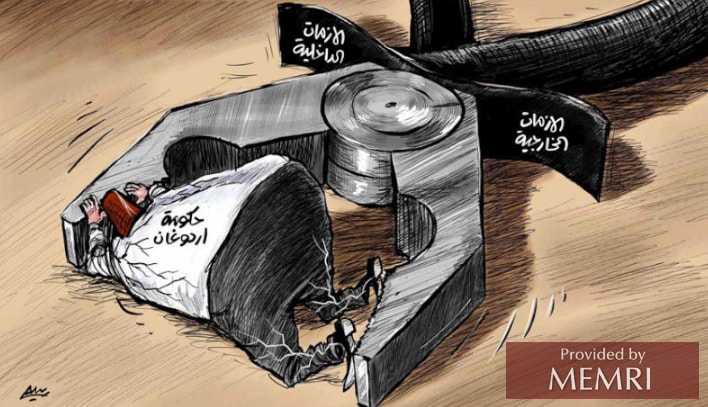In his July 5, 2019 column in the Saudi daily Al-Jazirah, journalist Muhammad Aal Al-Sheikh addressed the waning of Turkish President Recep Tayyip Erdogan's power in his country, manifested in his candidate's failure to win the municipal elections in Istanbul and in the increasing dissatisfaction of the younger generation in Turkey with his regime. Assessing that this situation could lead to Erdogan's downfall, Aal Al-Sheikh called on the Arab states to place this objective at the top of their agenda. The end of Erdogan's regime, he said, would leave Turkey's ally Qatar weak and isolated, which in turn might compel Qatar to stop sowing chaos and unrest in the region and to meet the demands of the countries that are boycotting it (Saudi Arabia, Egypt, the UAE and Bahrain), including the demand to stop financing terror.[1] Thus, the wars and conflicts in the region may come to an end, he said.
The following are excerpts from his column:[2]

Cartoon in Saudi daily: Turkey caught between "external crises" and "iternal crises" (Source: Al-Sharq Al-Awsat, London, July 19, 2019)
"I will not be saying anything new if I state that the Qatari gas is a catastrophe that spread among the Arabs, for it is this [gas] that lit the fuse of the internecine wars and clashes throughout the Arab world.[3] But the failure of the so-called Arab Spring became a reality on the ground. The Arabs understood that these revolutions, funded by means of this gas, were the reason for all the civil wars, some of which are still ongoing, [for example] in Syria, Libya and Yemen.
"But there is a [another] central and very significant point, namely the central role played by Erdogan's Turkey, which firmly supported the Qatari mini-state. I am sure that Erdogan's imminent downfall will weaken Qatar's insane efforts to salvage what can still be salvaged of the Arab Spring revolutions on which it spent millions, if not billions, of dollars to no avail. For this reason, fighting Erdogan and removing him from his seat [as president] of Turkey must be a top priority for the Arabs, for this means winning and ending the civil wars and [stopping] the security chaos [in the Arab World]. As for the Qatari mini-state and its resources, without Turkey it will be like a trembling leaf drifting in the wind.
"The victory of the Republican People's Party candidate in the Istanbul municipal elections [rather than Erdogan's candidate] is the kind of change we can exploit and leverage in order to powerfully besiege Erdogan, especially since this municipality is as [important as] Turkey as a whole. As Erdogan said himself: 'Whoever wins Istanbul wins Turkey... Erdogan has also involved Turkey in alliances and ties that will no doubt weaken the Turkish lira. Moreover, according to most reports, the Turkish people, and especially the younger [generation], are becoming dissatisfied with Erdogan because of his numerous mistakes. The chief of these mistakes is apparently his arbitrary attitude towards his opponents and those who disagree with him, especially in the military and the courts. He has placed unprecedented constraints on the media and on press freedom in Turkey, so that only his voice is heard... All these factors together caused the Turkish voters to reassess [their position on] this president, who seems to be trying to transform Turkey into an Ottoman dictatorship in the full sense of the term...
"Despite this series of blows, Erdogan continues his escapades, the latest of which is bringing Turkey into conflict with Cyprus over gas drilling, which provoked Europe's anger, as well as his intervention in the Libyan civil war even though Turkey has no stake in it. Thus, the deteriorating economic situation in Turkey is compounded by further burdens, and the reason for all of this is [Erdogan's] ideology, which requires him to help the Muslim Brotherhood movement there [in Turkey].
"Erdogan's downfall in Turkey, which is now imminent, means that the wars and crises in the Arab world, cultivated by Qatar, will end and the conflicts [Qatar] is instigating will lose much of their force. Then it will be possible to besiege Qatar in a way that will force it to either see reason and meet the 13 conditions posed to it by the boycotting states or to remain outside all of the regional considerations. In addition, the Muslim Brotherhood will meet the same fate as the Khawarij[4] in Islamic history."
[1] The four countries that have been boycotting Qatar since June 2017 presented this country with a list of 13 demands that it had to fulfil as a condition for the renewal of the relations, which included breaking off its ties with Iran and the Muslim Brotherhood, stopping its collaboration with Turkey, closing down the Al-Jazeera TV network and discontinuing its funding of terror (Al-Ahram, Egypt, June 24, 2019).
[2] Al-Jazirah (Saudi Arabia), July 5, 2019.
[3] This is apparently a reference to the so-called 'gas pipeline war' and the conspiracy theory that the Arab Spring, and especially the protests against the Syrian regime in 2011, were instigated by Qatar and the U.S. in response to this regime's decision in 2009 to withdraw from the Qatar-Turkey gas pipeline project. This megaproject – for piping natural gas from Qatar to Europe via Syria and Turkey – was meant to create an alternative to Russia's gas exports to Europe and yield vast profits for the U.S., Qatar and Turkey. Syria pulled out of it in favor of a deal to pipe Iranian gas to the Mediterranean via Syria and Iraq. According to the conspiracy theory, Syria took these steps at Moscow's behest in order to maintain Russia's dominance in the European gas market. See e.g., middleeasteye.net, May 10, 2017.
[4] Khawarij/Kharijites (literally, "those who come out") – an early Islamic sect that advocated excommunicating Muslims for even minor sins and was proclaimed heretical by the mainstream Sunna. Today, the term is used to brand Muslim groups as extremist.




